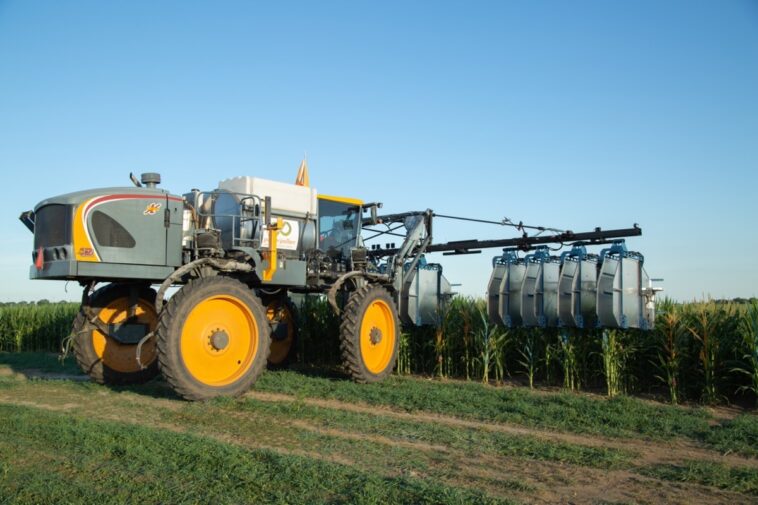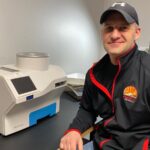Dr. Todd Krone spent more than 20-years leading seed and biotechnology advancements at leading agribusinesses, including Corteva Agriscience and Bayer. In these roles, he helped apply innovations to improve crop productivity for farmers around the world. In fact, several biotech traits he helped develop to improve insect control and herbicide tolerance in multiple crops and geographies are
still on the market today. Krone has remained passionate about solving some of farming’s most difficult challenges to meet food demand in a more sustainable manner. Today, Krone is the CEO of PowerPollen, a company changing the way growers pollinate by allowing the storage of corn pollen for preservation and later application.
How did PowerPollen come to be?
KRONE: While innovation has focused on seed genetics and crop inputs, the process of making hybrid seed is largely unchanged. Seed companies and farmers continue to rely on wind to pollinate crops. Since the 1930s, many have tried to preserve and store corn pollen in an efficient, scalable manner and failed due to its fragile nature. Despite extensive efforts by the seed industry to improve male sterility methods, hybrid seed production relies on decades-old planting methods that are inefficient and costly. Current protocols rely on planting delays and mechanical treatments to help synchronize the reproductive timing between the male and female plants, which is difficult to achieve.
In 2015, during which time there was a tremendous change happening across the ag industry, I decided to take a leap of faith and become an entrepreneur to focus solely on solving the pollination challenge. Together with my co-founder, Jason Cope, who brought unique expertise in ag engineering, we were able to attract other experienced talent that shared our excitement to tackle this challenge. Using our understanding of plant breeding, physiology, and extensive research and field testing, we invented a breakthrough technology to collect, preserve and apply pollen at a commercial scale.
Together, we formed PowerPollen, which has since secured several U.S. patents for our pollination process and technologies. By leveraging specially designed equipment and pollen preservation, PowerPollen has successfully applied our technology across thousands of commercial seed corn acres and increased yields on our customers’ commercial hybrid corn seed production fields. We are now looking to expand into other critical commodity crops, such as wheat.
What are some roadblocks you faced along the way?
KRONE: Like many start-ups, the challenge is to ensure your vision truly solves a problem. In the case of pollen preservation, we knew this was one of the last unaddressed challenges of plant breeding and the benefits span not only improving both yield and purity but also land utilization and other sustainability impacts. Seed companies and farmers who have seen our technology operating in the field are eager to access it. Satisfying such a large market quickly is challenging. We have worked hard to remain focused on each step in the process to scale while maintaining the highest level of customer service.
With such an innovative product, did you have a hard time getting growers to buy in?
KRONE: Preserving pollen in crops, such as corn, wheat and rice, has been the holy grail for many plant breeders so our customers were excited to implement our technology. Once we demonstrated we could preserve pollen and maintain its viability, customers have been very willing to continue to scale it to have the biggest possible impact. We recognized this was a challenge we couldn’t do alone and appreciated working with seed producers to scale our operations.
In 2020, after years of field testing, we signed collaboration agreements with several global agribusinesses, including Corteva and BASF. In the next several years, we plan to expand to offer the technology more broadly to benefit farmers.
What are some tips you have in this area, as far as getting people to be willing to try something so new?
KRONE: As with many things, “seeing is believing.” Having customers working alongside our scientists, engineers and many others on our team, allows us to improve our pollination technology to further demonstrate in-field results and lets customers see the results in their own fields. The most rewarding experience has been showing customers our technology and watching them get as excited as we are!

How will PowerPollen change the way we grow?
KRONE: Preserving and applying pollen unlocks opportunities and efficiencies never before achieved in production agriculture. Having the power to control and move pollen opens the door to seed fields of only female plants, with the pollen being supplied from storage. Ultimately, this could greatly improve land-use efficiency. The increase in yield means we produce more per acre than ever before. PowerPollen’s technology also increases genetic diversity by enabling seed companies to produce new hybrids that couldn’t exist without pollen preservation. These are just a few of the many changes that occur when pollen can be preserved.
For farmers in North Dakota, PowerPollen’s technology, already proven in corn, has the potential to increase pollination efficiency for hybrid wheat production. Commercial- scale hybrid wheat has been the goal of wheat breeders and seed companies since the 1950s. PowerPollen’s preservation and application technology expands the potential for hybrid wheat and improves productivity and profitability for wheat farmers. Together with BASF, we are working to further develop and apply our pollen preservation technology to wheat and accelerate hybridization of this staple crop.
What’s the worst piece of advice you ever received?
KRONE: To eliminate all risks. Human tendency is to overestimate the downside
of risk and spend inordinate resources eliminating them. I flip that advice to say: “properly assess the impact of risk.” Once you do that, you can decide which risks to spend time on and which ones to ignore. This process led me to take the leap to co-found PowerPollen.
What’s your why?
KRONE: Like me, the team at PowerPollen has dedicated their careers to improving agriculture and to increasing food security and the sustainability of food production. We see the tremendous impact modern science and technology can have on our food supply and our land. The opportunity to solve the problem of pollination is incredibly inspiring.
Do you have any book recommendations?
KRONE: As an entrepreneur in the ag industry at this unique moment in time, I’ve found that it’s critical to think out of the box and in many cases “out of the industry”. Loonshots: How to Nurture the Crazy Ideas That Win Wars, Cure Diseases, and Transform Industries outlines how many inventions that changed the world, like immunotherapy for cancer treatments, took many decades and many near death experiences to eventually get traction.
They were the right ideas from day one, but it took grit to bring them to fruition.
To learn more, visit powerpollen.com




